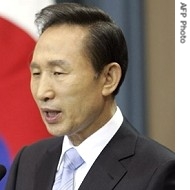VOA标准英语10月-South Korea Seeks Regional Fund to Shield Against(在线收听)
 |
| Lee Myung-bak (File) |
South Korean President Lee Myung-bak is proposing a joint fund of about $80 billion between South Korea, Japan and China, to shield the region from the American credit problems. Lee administration officials are expected to push for the plan on the sidelines of an International Monetary Fund meeting, next week. Mr. Lee is scheduled to discuss it in a three-way Beijing summit, later this month.
South Korea's Finance Minister, Kang Man-soo warned a gathering of bankers Monday in Seoul, it may take a long time for President Bush's signing of the financial bailout law, last week, to have positive effects. In the meantime, he is telling banks to get proactive about turning their overseas holdings into dollars that can be lent to South Korean businesses.
He is telling the business community not to rely on the government, alone. He says banks need to work their way out of the problem. He advises then to raise dollars by selling foreign assets, as soon as they can.
As in other countries, South Korea is experiencing a shortage of U.S. dollars. Its economy, the world's 13th largest, is heavily dependent on exports of goods and imports of oil, both of which are chiefly sold in dollars. Markets for even the most conservative short-term loans are constricting in the United States. Many financial institutions are hoarding dollars, in case of more trouble, and that is making it hard for companies to borrow cash for basic needs, like purchasing raw materials and expanding their business.
Jun Gwang-woo, chairman of South Korea's Financial Services Commission, urges South Korean banks not to follow suit.
He says banks should be ready to provide promising small and medium-sized enterprises with strong support, because they face a shortage of cash.
South Korea is arranging to help small and medium businesses with $5 billion, through various trade deals. It is also injecting ten-billion dollars into the financial system, to make it easier for banks to lend.
As an export giant, South Korea holds one of the world's largest dollar reserves, about $239 billion. These reserves have declined for six consecutive months, raising some preliminary alarm bells among investors and leaders here. South Korea's currency, the won, has fallen to its weakest level against the dollar in six years, amid fears of worsening exports.